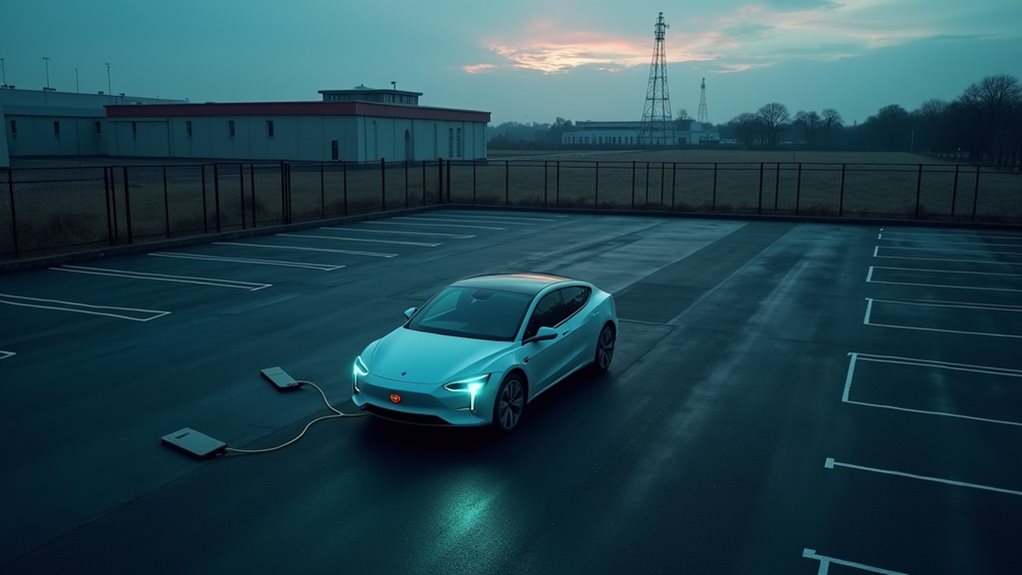Major UK defense contractors are warning staff not to charge phones in Chinese-made electric vehicles due to security concerns. Companies like BAE Systems and Rolls-Royce fear these vehicles could collect and transmit sensitive data to China. Some firms have implemented strict guidelines, including requirements to park Chinese EVs at least two miles from sensitive sites. The precautions aim to prevent potential espionage through the vehicles’ connected systems. Further details reveal how extensive these security measures have become.

Major British defense contractors have issued urgent warnings to their employees about the potential security risks posed by Chinese electric vehicles. Companies like BAE Systems, Rolls-Royce, Raytheon, Lockheed Martin, and Thales are implementing strict precautionary measures to protect sensitive information from potential espionage attempts.
You’ll find these defense giants adopting what industry insiders describe as a “cautious” and “belt and braces” approach to security. The concerns center around the possibility that Chinese-made vehicles could collect and transmit sensitive data back to China.
Industry giants implement robust safeguards against potential data harvesting by Chinese EVs amid growing cyber-espionage concerns.
Staff at these firms are specifically instructed not to charge their phones in Chinese EVs, as this could potentially expose data in a manner similar to plugging into an unknown USB port. They’re also advised against discussing work-related matters inside these vehicles, where microphones might capture conversations.
The precautions extend beyond personal device usage. Employees at some facilities can’t park Chinese EVs in production plant car parks, with some companies requiring these vehicles to be parked at least two miles away from sensitive sites. These measures align with directives at facilities like RAF Wyton, where staff have been told to park Chinese vehicles at least two miles from the base.
Popular Chinese brands in the UK market include BYD, MG (owned by Chinese conglomerate SAIC Group), and Polestar. Together, these manufacturers sold over 25,000 vehicles in the UK in March alone, with MG accounting for nearly 16,000 units.
The security concerns focus on the risk that journeys, locations, text messages, and documents could be compromised through vehicle connections. Defense firms worry that GPS systems and sensors in these vehicles might enable surveillance by the Chinese state.
Despite these company-level restrictions, the Ministry of Defence hasn’t issued central mandates regarding Chinese EVs. However, the UK government has been working to address potential threats in vehicle construction.
This cautious approach reflects heightened tensions over technological security between Western nations and China. You’ll find defense contractors particularly vigilant about protecting intellectual property and national security information in an era of increasing digital vulnerability. The risks are amplified by the fact that all electric vehicles are considered connected devices transmitting data beyond the vehicle itself.
Frequently Asked Questions
Which Specific Chinese-Linked Car Manufacturers Are Considered Security Risks?
Several Chinese-linked car manufacturers are flagged as potential security risks in the UK.
You’ll find MG (owned by SAIC Group) specifically mentioned due to its significant market presence.
BYD is another major concern because of its advanced vehicle technology.
XPeng, while smaller in market share, is also identified as a risk.
Polestar has Chinese connections but receives less security scrutiny than the others.
These brands collectively represent over 25,000 monthly sales in the UK.
How Can Phones Be Compromised When Charging in Vehicles?
Your phone can be compromised when charging in vehicles through several methods.
When you connect your device, the car’s systems can potentially extract data like contacts, messages, and travel information through the USB connection.
Malicious software might be installed on your phone through vulnerable charging ports.
The vehicle’s infotainment system could also initiate unauthorized access to your information if it lacks proper security protocols or encryption.
These vulnerabilities are especially concerning in networked, modern vehicles.
What Security Protocols Do Defense Contractors Implement for Employee Devices?
You’ll find defense contractors implement rigorous security protocols for employee devices.
They enforce strict access controls with multi-factor authentication and biometric options.
Regular software updates and patch management are mandatory, while endpoint detection systems provide real-time monitoring.
Mobile device management solutions control company devices with encryption and remote wipe capabilities.
Many firms limit or prohibit personal devices for work purposes.
These measures create multiple layers of protection against potential security threats.
Are There Alternative Safe Charging Methods Recommended for Staff?
You can safely charge your devices using several alternatives instead of untrusted sources.
Use portable power banks that you own and control for on-the-go charging. Wireless charging pads with your personal adapters eliminate physical port vulnerabilities.
When at secure facilities, connect to designated workplace charging stations or standard AC wall outlets.
For added protection, consider using “USB condoms” that block data transfer while allowing power flow through charging cables.
Have Any Actual Data Breaches Occurred Through Vehicle Charging Ports?
Yes, documented breaches have occurred through vehicle charging ports.
In 2021, Ukrainian hackers compromised Russia’s largest EV charging network and stole 900GB of data.
In 2022, chargers on the Isle of Wight displayed pornographic content after system penetration.
More recently, in 2024, researchers discovered six zero-day vulnerabilities in charging management protocols.
These incidents demonstrate that charging ports can serve as entry points for data theft and system manipulation.





